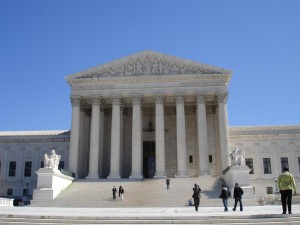 On March 5, the Supreme Court will hear arguments on whether the fraud-on-the-market presumption in securities class actions should survive. The case is Halliburton v. Erica P. John Fund and it could be groundbreaking. If the Supreme Court jettisons the presumption, it will close a major avenue for securities class-action lawsuits.
On March 5, the Supreme Court will hear arguments on whether the fraud-on-the-market presumption in securities class actions should survive. The case is Halliburton v. Erica P. John Fund and it could be groundbreaking. If the Supreme Court jettisons the presumption, it will close a major avenue for securities class-action lawsuits.
Update: The US Supreme Court issued its decision on June 23, 2014.
But what does this mean for antitrust lawsuits? We’ll get to that in a moment.
First, some background: In 1988, the Supreme Court held in Basic v. Levinson that when a shareholder class sues a company under Rule 10b-5 (for misrepresentation, etc.), it need not show that the individual class members relied on the misrepresentations because the stock market is “efficient” and such statements are quickly incorporated into the stock price.
So if you purchased a share of stock after a management official said that the company increased revenue twenty-percent year-over-year even though the manager knew that the revenue numbers were not accurate, you purchased stock that was already inflated from the statements because the market incorporated those statements immediately into the stock price.
Remember the classic book, A Random Walk Down Wall Street? It is all about efficient-market theory. Great book, by the way.
Anyway, since the Basic v. Levinson decision, economists and others have questioned the economic foundation of the fraud-on-the-market theory. In fact, several years ago, I myself researched whether developments in behavioral economics were sufficient to knock out the theory. I have some experience with securities litigation, which I find interesting, though not as enjoyable as antitrust (too formulaic at times, in my view). You can read a law review article I co-authored with Carl Hittinger on securities litigation here, where we discuss the Private-Attorney General model in both antitrust and securities litigation.
Many people are making a big deal out of the fact that the Supreme Court might overturn a relatively recent decision—1988—based upon a change in economic thinking. But for those of us in the antitrust world, it doesn’t seem that unusual. Antitrust doctrine in the United States and throughout the world is constantly adjusting to both economic and academic developments. That is part of what keeps it fresh and interesting.
If the economic foundation behind a court-developed doctrine is no longer valid, the Supreme Court should revisit it. Of course, perhaps the Legislature should have controlled the entire process, and the Supreme Court should not have developed the short-cut in the first place, but that is a separate debate that could take up many blog posts, and several Federalist Papers.
But, enough of the securities-litigation talk, I know you really just want to know what this means for antitrust lawsuits and antitrust attorneys.
Not surprisingly, a market has developed of plaintiff attorneys that file securities class-action lawsuits. Some of these attorneys and firms also file antitrust lawsuits. And others could start to file antitrust lawsuits with little difficulty.
If the Supreme Court decreases the pay-off or increases the cost of filing securities class actions by striking the fraud-on-the-market theory—which would really cut into securities lawsuits—these plaintiff attorneys will need to find something to do.
Some of them will use other provisions in the securities laws to continue to file lawsuits, and I expect those types of suits to increase if certain Rule 10b-5 claims are blocked. Others will begin to look at other types of claims they could bring as “private-attorney generals.” Remember that like other specialties, filing class-action lawsuits is a specialty in and of itself.
Many class-action plaintiff attorneys will put more resources into finding antitrust claims that they can bring on behalf of class members. The Supreme Court has made it more difficult to advance with a class action over the last decade or so, but there are still openings.
And with a large group of creative and intelligent lawyers looking to feed their families, I wouldn’t be surprised if we begin to see that creativity play itself out in the antitrust field. Most antitrust class actions challenge per se antitrust violations, but with that “low-hanging fruit” so crowded, perhaps we will see some creative attorneys begin to challenge monopoly or dominant exclusionary conduct via class action?
By the way, you can visit the Facebook page for The Antitrust Attorney Blog here. If you like it, please “like it.”
 The Antitrust Attorney Blog
The Antitrust Attorney Blog


